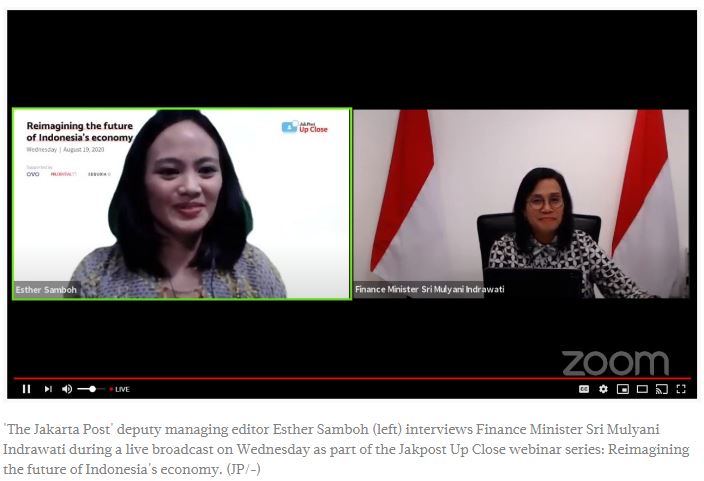Pandemic an opportunity for reforms in Indonesia: Sri Mulyani
Indonesia is aiming to capitalize on the coronavirus crisis to roll out sweeping reforms in education, health care and social safety nets, says Finance Minister Sri Mulyani Indrawati, calling the pandemic a “short-term challenge” to the country’s vision.
Sri Mulyani told The Jakarta Post in a live broadcast interview on Wednesday that proper education, health care and social safety systems were required to develop a strong future generation, and that human capital was central to development progress.
“For a country to become a great country – [since] there is no great country without great people – is always [a] human-centered [task],” Sri Mulyani said during the Post webinar series Jakpost Up Close: “Reimagining the future of Indonesia’s economy”.
After his reelection, President Joko “Jokowi” Widodo rolled out the Golden Indonesia 2045 vision, which envisions Indonesia as a developed country with Rp 270 million in annual per-capita income. Then, the pandemic hit, forcing the government to redirect funds into COVID-19 containment measures.
“We will use all of our policy instruments to face this short-term challenge without losing sight of what is really important, such as human capital, infrastructure, an efficient bureaucracy and the ease of doing business,” said the finance minister.
World Bank lead economist for Indonesia Frederico Gil Sander said the country would indeed need to invest more in its social protection and healthcare systems to address future shocks. Despite years of progress in Southeast Asia’s largest economy, he went on to say, more investment would also be needed in health care and infrastructure.
“Going forward, having a robust social protection system will help Indonesia address a lot of shocks, such as natural disasters or a future pandemic,” Gil Sander said. Millions are at risk of losing jobs and falling into poverty as the COVID-19 pandemic is likely to shave growth to near zero percent, the government has estimated.
The government, he added, would need to raise tax revenue to pay for the much-needed investments, otherwise it may hurt the country’s competitiveness.
“As the economy recovers, it will be important to have a roadmap of how Indonesia can raise more revenue […] to sustainably pay for these important expenditures,” Gil Sander said.
Former finance minister Chatib Basri also said that the government would need to spend stimulus funds for social aid more quickly, adding that that would boost household demand, which was needed to revive the economy.
“The only spending that can achieve quite a significant level of absorption is social aid, not tax incentives,” he said during the same webinar, adding that the government should be more “pragmatic by allocating funding in which the government could spend the money”.
“The government should focus on cash transfers and extend it to the middle class” rather than maintaining the current tax incentives, he went on to say. “If there is no economic activity and companies are running losses, they don’t pay tax anyway.”
The government has only spent Rp 151.25 trillion (US$10.23 billion) of its stimulus budget totaling Rp 695.2 trillion, according to data from the Finance Ministry as of Aug. 6, five months after the outbreak began in Indonesia.
President Jokowi has asked to pour out the money through the economy, but “pouring it out isn’t just like flushing it down the toilet. You really have to spend [the money], and somebody is going to audit you,” Sri Mulyani said, referring to the role of the Supreme Audit Agency (BPK).
The finance minister said a lack of population data and red tape were among the main factors holding up budget fund disbursement, adding that several new ministers were finding it hard to reprioritize and cut their budget allocations amid the ongoing crisis.
“The current budget priority is not to increase output but for survival,” said a special advisor to the finance minister, Masyita Cristallin, during the webinar, adding that the government was planning to expand the country’s tax base and undertake structural reforms.
“We are looking at different solutions, such as changing the tax rate on some regressive tax, so that tax may become progressive […]. This can stimulate the economy and be good for equality,” she said. “The government is undertaking reforms to develop downstream industries and increase the value [of products]. This may also improve revenue collection.”
Indonesian Employers Association (Apindo) vice chairwoman Shinta Widjaja Kamdani said structural reforms, including those formulated in the omnibus bill on job creation, would create much-needed jobs in the country.
“We can’t create enough jobs at the moment, so this is why the omnibus bill plays a very important role to create jobs by driving investment into the country,” she said, adding that attracting investment would need a government that could cut red tape.
For the private sector, the pandemic has shed light on the future of Indonesia’s economy, in which technology will play an important element, said Shinta and other representatives of the private sector in the webinar, Sequoia Capital (India) managing director Abheek Anand, Prudential Indonesia president director Jens Reisch and OVO president director Karaniya Dharmasaputra.
Source: https://www.thejakartapost.com/news/2020/08/21/pandemic-an-opportunity-for-reforms-in-indonesia-sri-mulyani.html


 English
English




